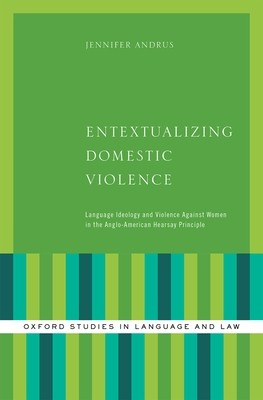
- We will send in 10–14 business days.
- Author: Jennifer Andrus
- Publisher: Oxford University Press, USA
- ISBN-10: 0190225831
- ISBN-13: 9780190225834
- Format: 15.5 x 23.6 x 2.8 cm, hardcover
- Language: English
- SAVE -10% with code: EXTRA
Reviews
Description
Language ideology is a concept developed in linguistic anthropology to explain the ways in which ideas about the definition and functions of language can become linked with social discourses and identities. In Entextualizing Domestic Violence, Jennifer Andrus demonstrates how language ideologies that are circulated in the Anglo-American law of evidence draw on and create indexical links to social discourses, affecting speakers whose utterances are used as evidence in legal situations. Andrus addresses more specifically the tendency of such a language ideology to create the potential to speak for, appropriate, and ignore the speech of women who have been victims of domestic violence. In addition to identifying specific linguistic strategies employed in legal situations, she analyzes assumptions about language circulated and animated in the legal text and talk used to evaluate spoken evidence, and describes the consequences of the language ideology when it is co-articulated with
discourses about gender and domestic violence.
EXTRA 10 % discount with code: EXTRA
The promotion ends in 16d.09:18:12
The discount code is valid when purchasing from 10 €. Discounts do not stack.
- Author: Jennifer Andrus
- Publisher: Oxford University Press, USA
- ISBN-10: 0190225831
- ISBN-13: 9780190225834
- Format: 15.5 x 23.6 x 2.8 cm, hardcover
- Language: English English
Language ideology is a concept developed in linguistic anthropology to explain the ways in which ideas about the definition and functions of language can become linked with social discourses and identities. In Entextualizing Domestic Violence, Jennifer Andrus demonstrates how language ideologies that are circulated in the Anglo-American law of evidence draw on and create indexical links to social discourses, affecting speakers whose utterances are used as evidence in legal situations. Andrus addresses more specifically the tendency of such a language ideology to create the potential to speak for, appropriate, and ignore the speech of women who have been victims of domestic violence. In addition to identifying specific linguistic strategies employed in legal situations, she analyzes assumptions about language circulated and animated in the legal text and talk used to evaluate spoken evidence, and describes the consequences of the language ideology when it is co-articulated with
discourses about gender and domestic violence.


Reviews